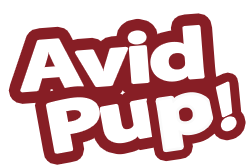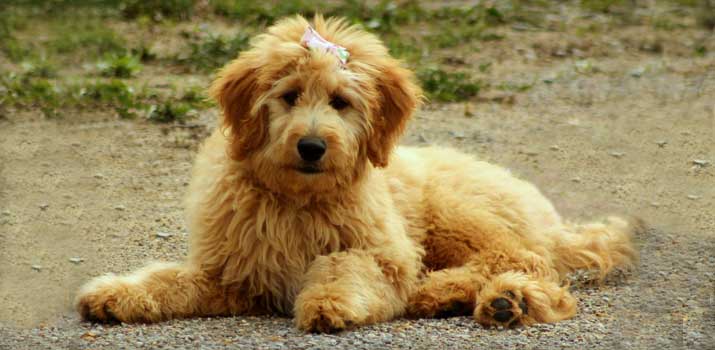
First bred back in the late 1960s, Goldendoodles quickly grew in popularity. Today, they’re one of the most popular “designer” breeds out there. While they’re not officially recognized by the American Kennel Club, that hasn’t stopped dog lovers from adopting these adorable pups.
As the name would suggest, Goldendoodles are a cross-breed between Golden Retrievers and Poodles. Goldendoodles combine the best traits of the two parent breeds, which are already very popular the world over.
These dogs are energetic, full of life, and great with families. Best of all, most modern Goldendoodles take on that signature Poodle coat of curly hair, which is easier to take care of than standard fur.
Like any dog, providing your Goldendoodle with a high-quality diet is essential.
Because the hybrid canine is not officially recognized, you’re not going to find food that’s specifically formulated for their needs. As a result, it’s more important than ever to brush up on your canine diet knowledge and find a food that can support your dog’s health from the inside out.
Here are some of the best dog food options for adult and puppy Goldendoodles.
7 of the Best Dog Foods for Goldendoodles
1. Wellness CORE Grain-Free Original Deboned Turkey Recipe Dry Dog Food
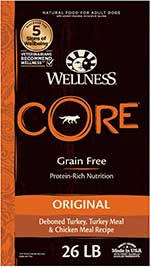
The grain-free adult formula from Wellness Core is ideal for Goldendoodles.
It’s great for avoiding potential allergic reactions while giving your pooch everything they need to thrive. The dry kibble has an impressive 34 percent protein.
Most of that protein comes from deboned turkey, turkey meal, and chicken meal. In total, there’s about 16 percent fat. Thanks to the inclusion of salmon oil, that fat content will support your dog’s immune system and coat.
When it comes to vitamins and minerals, there’s no shortage of great stuff. The formula uses parsley, apples, blueberries, and so much more. The recipe even has probiotics for digestive health and supplements for joint care.
2. Blue Buffalo Freedom Adult Chicken Recipe Grain-Free Dry Dog Food
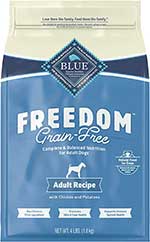
This simple dog food option from Blue Buffalo is made for dogs with sensitive stomachs. The ingredients are limited to avoid potential issues.
Deboned chicken is the main protein of choice. It contributes to the 24 percent protein content. There are absolutely no grains or any unnecessary fillers. Instead, it has the brand’s LifeSource Bits.
These vitamin-rich morsels are designed to improve the immune system. they’re made of healthy antioxidants, which are great for preventing cell oxidation and fighting off free radicals.
3. Merrick Grain-Free Chicken + Sweet Potato Recipe Dry Dog Food
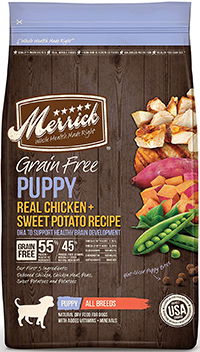
If you’re looking for high-protein dog food to keep your dog active, consider this grain-free option from Merrick. In total, the formula is made up of 38 percent protein.
Not only that, but Merrick uses a few different types of meat to provide a complex array of amino acids.You’ll find chicken, turkey meal, and salmon meal. The fat content is on the higher end at 17 percent.
However, a lot of that percentage comes from the salmon oil and flaxseed, which are rich in omega fatty acids. For carbohydrates, complex ingredients like sweet potatoes and peas are used. Plus, there’s alfalfa for fiber.
4. ORIJEN High-Protein, Grain-Free, Premium Animal Ingredient, Dry Dog Food
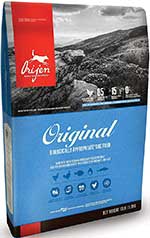
This premium dog food from Orijen is made up of 85 percent animal-based ingredients. It’s designed to imitate what canines in the wild eat. So, your dog is consuming a recipe that’s 38 percent protein, 18 percent fat, and 12 percent fiber.
The list of proteins is quite impressive.
The food has deboned chicken, deboned turkey, Atlantic flounder, chicken organs, Atlantic herring, and much more. As for plant-based ingredients, the formula doesn’t disappoint.
There’s pumpkin, butternut squash, and a slew of different greens. They all help with fiber. Plus, the pumpkin and squash do double-duty as a carbohydrate source.
Best for Goldendoodle Puppies
5. Instinct by Nature’s Variety Raw Boost Large Breed Puppy Recipe with Real Chicken
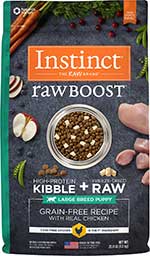
Purposefully made with the nutritional requirements of puppies in mind, the Raw Boost formula from Instinct is great for growing Goldendoodles.
With about 33.5 protein, your young pup has plenty of fuel to grow.
This food has a nice blend of chicken, fish, and lamb. It also has the magic ratio of calcium and phosphorus for good measure.
In addition to the standard kibble pieces, this recipe also has small morsels of freeze-dried raw food.
It provides that added kick of flavor while ensuring that your dog is getting all the protein he or she needs.
6. Nutro Wholesome Essentials Large Breed Puppy Lamb & Rice Recipe
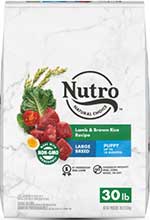
The Nutro large breed puppy food only has the essentials. It uses Australian and New Zealand lamb as the primary protein source, which makes up about 26 percent of the formula.
The food also has a good dosage of omega fatty acids and plenty of vitamins to support your pup’s body. To start your dog’s joints off right, the food also has naturally sourced glucosamine and chondroitin.
There are no artificial preservatives or unnecessary filler ingredients. Only the best for your pup.
Reccommended Wet Canned Food for Goldendoodles
7. Nutro Puppy Grain-Free Tender Chicken & Sweet Potato in Gravy Recipe Canned Dog Food
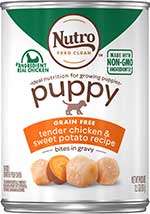
Another suitable option from Nutro is this canned food. It’s great for softening up your puppy’s standard kibble to make it easier to eat and more appetizing.
This particular formula uses real pieces of tender chicken swimming in a delicious broth. You’ll also find chunks of sweet potatoes and peas. Nutro utilizes pork plasma and chicken liver as well for vitamins and minerals.
The great thing about this canned food is that you can see a lot of the ingredients in the bowl, so there’s no second-guessing.
How Much Food Does a Goldendoodle Need?
How you choose to feed your dog is just as important as what you feed them. Too much of a good thing can do just as much damage as substandard food.
When you’re planning out meals, it’s important to consider the calorie density of the food. Some food products contain more calories per cup than others, so check with the labeling for accurate information.
On average, a healthy adult Goldendoodle will need about 1,200 calories every day. However, that number can fluctuate based on body condition and lifestyle.
More active dogs will need more calories every day to replenish their energy levels.
On the other hand, lazy dogs and seniors will need fewer than 1,200 calories to avoid weight gain. Check with your vet more guidance.
Finding a High-Quality Dog Food
Unlike other established breeds, there are no dog food formulas that are made for Goldendoodles. Instead, you’ll find a large variety of food products for large breeds.
To ensure that your dog is getting the very best that money can buy, keep an eye out for the following elements.
High Protein Content
High-quality proteins are the building blocks of your dog’s muscles. They provide amino acids to support the muscles while giving your pooch plenty of energy to play.
The quality and concentration of protein of the dog food are what you need to pay attention to.
At the very least, the product you go with should have between 18 and 25 percent protein. Though, it’s always recommended that you go higher than that.
Some of the best dog foods have around 30 percent protein to ensure that your dog’s muscles are getting the best support possible.
The protein sources should be at the top of the ingredients list.
Look out for wholesome meat sources like chicken, turkey, fish, lamb, and more. Meat meals are fine if the animal is identified.
Avoid any mystery protein ingredients that don’t explicitly state what animal they came from. Also, steer clear of byproducts. Natural is always best.
Good Fats
Contrary to popular belief, there’s nothing wrong with a bit of fat. Around 15 percent fat is great. Natural animal fats from the protein source are a good option.
If you’re looking for something even better, go with something like flaxseed oil or salmon oil.
Those two fat ingredients contain omega fatty acids, which are crucial to your dog’s overall health. Omega fatty acids can support cardiovascular health, keep the skin supple, and more.
One of the most important omega fatty acids is DHA. It can keep your pup’s eyes healthy and avoid those unwanted ocular problems we went over earlier.
Complex Carbs
There’s no official recommendation about carbohydrate percentage in dog foods. However, most veterinarians agree that complex carbs are much better than simple carbs.
Complex carbs, such as sweet potatoes and peas, break down in the body slowly over time.
This is in stark contrast to simple carbs that are absorbed quickly.
With complex carbs, your dog will experience a steady supply of energy throughout the day instead of one hyped burst. Plus, it helps to keep the glycemic index low and avoid diabetes.
Fruits and Vegetables
Don’t forget about fruits and vegetables! While protein is the cornerstone of any canine diet, fruits and vegetables are a good source of essential vitamins and minerals.
Leafy greens, such as alfalfa, spinach, lettuce, and more, can also introduce fiber into your dog’s diet to keep things regular.
If you’re looking for the best food possible, go with a product that uses antioxidants like blueberries. They can fight off free radicals and keep your dog healthy on a cellular level.
Carrots are also good for Goldendoodles. They’re high in beta-carotene, which is essential for good eye health.
Joint Support
To combat joint issues, you can provide your dog with food that has glucosamine and chondroitin. These ingredients are commonly found in food for seniors and large breeds.
Essentially, they keep the cartilage between the joints in good condition to avoid pain.
What About Puppies?
Growing pups need a lot of food to stay healthy. According to the National Research Council, they need twice as many calories per pound of body weight as adults do.

Typically, your puppy will do just fine with 40 to 50 calories per pound of weight. Though, some vets recommend that larger dog breeds, such as the Goldendoodle, need upwards of 70.
Consult with your vet to get the right amount.
Aside from all of those nutritional requirements from the previous section, your puppy also needs some calcium and phosphorous.
These two minerals are paramount for proper bone development. The amount of these minerals will vary from brand to brand.
As a good rule of thumb, the proper ratio of calcium to phosphorus is 1.2:1. Stick to this golden ratio to avoid developmental issues, orthopedic problems, and bone spurs.
It’s always a good idea to go with a formula that’s made for large breed puppies. These dog foods contain all the right ingredients to support your puppy’s health as they grow into adults.
When your puppy is first weaned off their mother’s milk, start by separating their daily food into four separate meals. Puppies have voracious appetites. But, you also need to avoid overfeeding to combat excessive weight gain.
Over time, you can decrease the frequency of their meals until you’re down to two a day.
Common Health Issues
When breeders combine two breeds to make a new “designer” dog, there’s a risk of the puppy developing common health issues from both parent breeds.
Both Golden Retrievers and Poodles are not immune to health issues.
A healthy Goldendoodle can live to be 15 years old. However, that’s only if you keep them healthy with regular excise and a healthy diet. Here are some common health issues to be wary of.
Hip Dysplasia and Joint Issues
Any dog that weighs over 50 pounds is at risk for joint problems. As dogs get older, the stress on their joints can lead to painful arthritis.
Goldendoodles are also known to experience luxating patella, which is when the knee joints slip out of position.
To avoid this, you should choose foods that support the cartilage in the joints. Regular exercise helps, too.
Hip Dysplasia is a medical condition that often stems from poor development as a puppy. You have to remember that young puppies are going to gain a massive amount of weight during their first year of life.
All of that stress during the growth cycle can cause abnormal bone growth.That’s why it’s important to stay on top of your dog’s diet, especially during the puppy years. There’s a fine line between overfeeding them and not providing enough calories.
With hip dysplasia, the hip socket is not formed correctly. Oftentimes, you won’t even know that this is an issue until later on in your dog’s life.
Ocular Problems
Cataracts, progressive retinal atrophy, and other eye problems are quite common with Goldendoodles. While degrading vision is to be expected in an aging dog, it seems to be more common with this hybrid breed.
While you can’t prevent these conditions from occurring completely, you can do your part to support your pup’s ocular health. Vitamin E, Vitamin C, omega fatty acids, beta-carotene, and plenty of antioxidants can keep your pup’s eyes in good condition.
Bloat
Bloat, which is also known as gastric dilation volvulus, is a potentially fatal health issue that plagues large dogs. Goldendoodles tend to have deep chest cavities, which doesn’t help the problem one bit.
When bloat occurs, the stomach dilates and twists. This can lead to problems breathing, circulation issues, and eventual death.
It’s an emergency that requires immediate medical attention. So, how can you help your dog avoid the issue?
Well, you need to control how much your dog eats and how fast they scarf down their meals.
It often occurs because dogs eat too fast and take in a lot of air. Some dogs also experience it when they start running around after a meal. Portion out your pup’s meals accordingly. If necessary, invest in a slow feeder as well.
About Goldendoodles
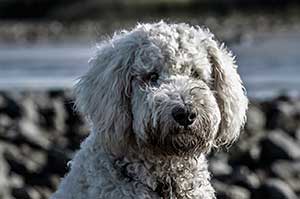
As we mentioned earlier, Goldendoodles are a cross between the lovable Golden Retriever and the Standard Poodle.
While you can get a general idea of how cross-bred dogs will look based on their parents, it’s not an exact science.
As a result, Goldendoodles can be more difficult to predict when it comes to health and appearance.
For example, the average weight range of these dogs is quite wide. On the lower end of the spectrum, you could end up with a Goldendoodle that weighs about 45 pounds.
However, it’s not uncommon for these lovable pups to reach upwards of 100 pounds when fully grown.
The unknowns often come from the Poodle side. You see, there are three different classifications of Poodles. There’s the Standard Poodle, the Medium Poodle, and the Miniature Poodles.
Goldendoodles bred from a Miniature Poodle are often between 15 and 30 pounds.
Miniature and Medium Goldendoodles are quite rare. Breeders typically use Standard Poodles when cross-breeding, creating a large hybrid dog.
It’s important that you go to a reputable breeder to get a better understanding of what you can expect. The nutritional requirements for a large dog are vastly different than smaller ones.
Conclusion
Goldendoodles are a fun new breed that’s shaking up the dog world. While they may not be an “official” dog breed, the unique personalities of these canines make them a joy to be around.
Raising a Goldendoodle can be a very rewarding experience. Just make sure that you pick the right food to keep them happy and healthy for years to come.
Also Read: Best Food for Puppies with Sensitive Stomachs

